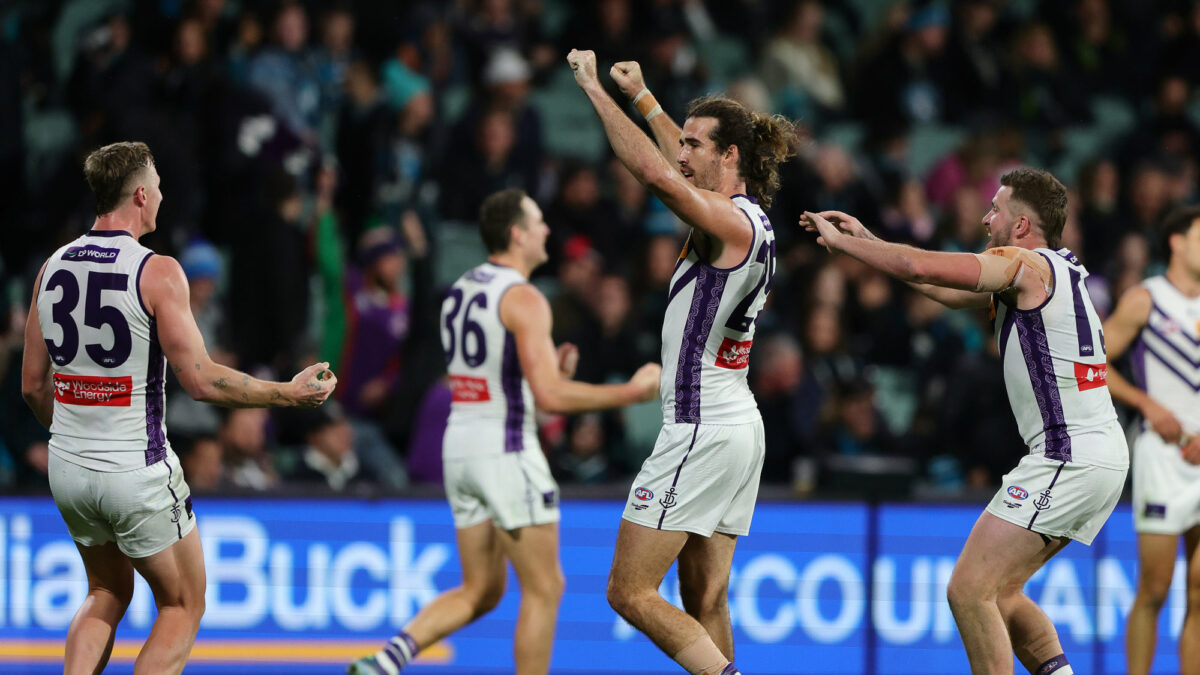At two separate points in the final quarter at the Adelaide Oval, Fremantle’s season was on the brink.
Having watched a four-goal start ripped away from them by Port Adelaide via a disastrous second quarter, the Dockers found themselves eight points down at three quarter time, a lead extended to 14 by the first goal of the final term going the Power’s way.
Then, having steadied the ship and taken back the lead, given it up in the dying moments via a disastrous defensive system collapse that let a cramping Connor Rozee in for what seemed like the game-winner.
For 30 years, Freo have been masters of fluffing their lines just when it seemed a breakthrough as a powerhouse was just around the corner; losing to a team outside the top nine in the Power to undo weeks of hard work and the best record of anyone against the contenders and throw themselves right back into the mire ahead of an ultra-tough last fortnight would just be the latest in a long line of heartbreaks Dockers fans have been forced to contend with.
But this Fremantle feels different.
For starters, that deficit, and the momentum running firmly the Power’s way in front of a crowd beginning to sense an against-the-odds triumph and rising in volume, never felt insurmountable the way it would for most teams.
For this is Freo, 2025’s master of the close finish.
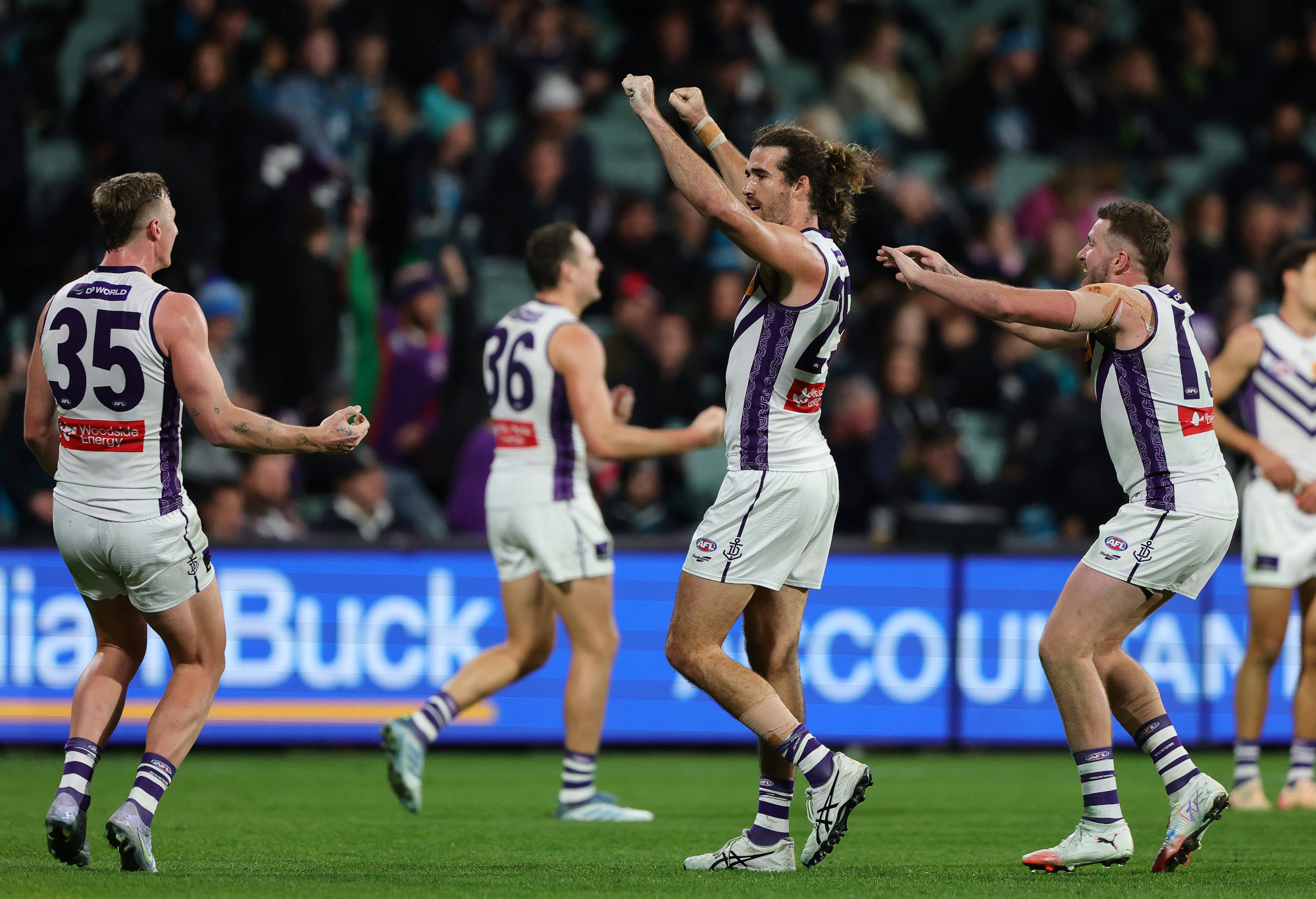
Alex Pearce celebrates with jubilant teammates after Fremantle’s win over Port Adelaide. (Photo by Sarah Reed/AFL Photos via Getty Images)
Four times in their last six weeks, five of those wins, they have come back from trailing at three quarter time to storm away with the four points against teams both good and bad, at home and on the road. Through both unprecedented levels of fitness, especially from their brilliant midfield, and a master plan orchestrated by Justin Longmuir for approaching the final minutes of tight games, they are Collingwood of 2022 and 2023 on a slightly smaller scale.
This is the story of the Dockers’ latest jailbreak. Of incredible kicks, disastrous mistakes, and two clutch captains battling fatigue and injuries stepping up in the most spectacular fashion to decide this match at the death.
Freo’s comeback begins with a man whose days as matchwinner-in-chief seemed done about five years ago: Nat Fyfe.
This is Fyfe’s fifth game of the season, or fourth if you discount him tweaking a calf at half time while sub against St Kilda in Round 16. In all but one of those games, he has been the substitute, and in the fifth he was the one taken out of the game.
33-year old legs surely barely able to support his weight after half a decade’s worth of injury after injury have just about ended his days of playing out a full match – but it’s noticeable both that Longmuir trusts the champion enough to influence the game at the death to have him right in the midfield mix.
And that, consistently now, that trust is being rewarded.
So when the ball is bounced with a tick under 17 minutes to go and Fremantle’s deficit 14 points, it’s to no surprise that it’s Fyfe who wins the centre clearance. And in classic Fyfe fashion, too: bullying out of the way a not-inconsiderable rival in Connor Rozee, deftly spinning away from another not-inconsiderable rival in Zak Butters, and driving Freo long and deep.
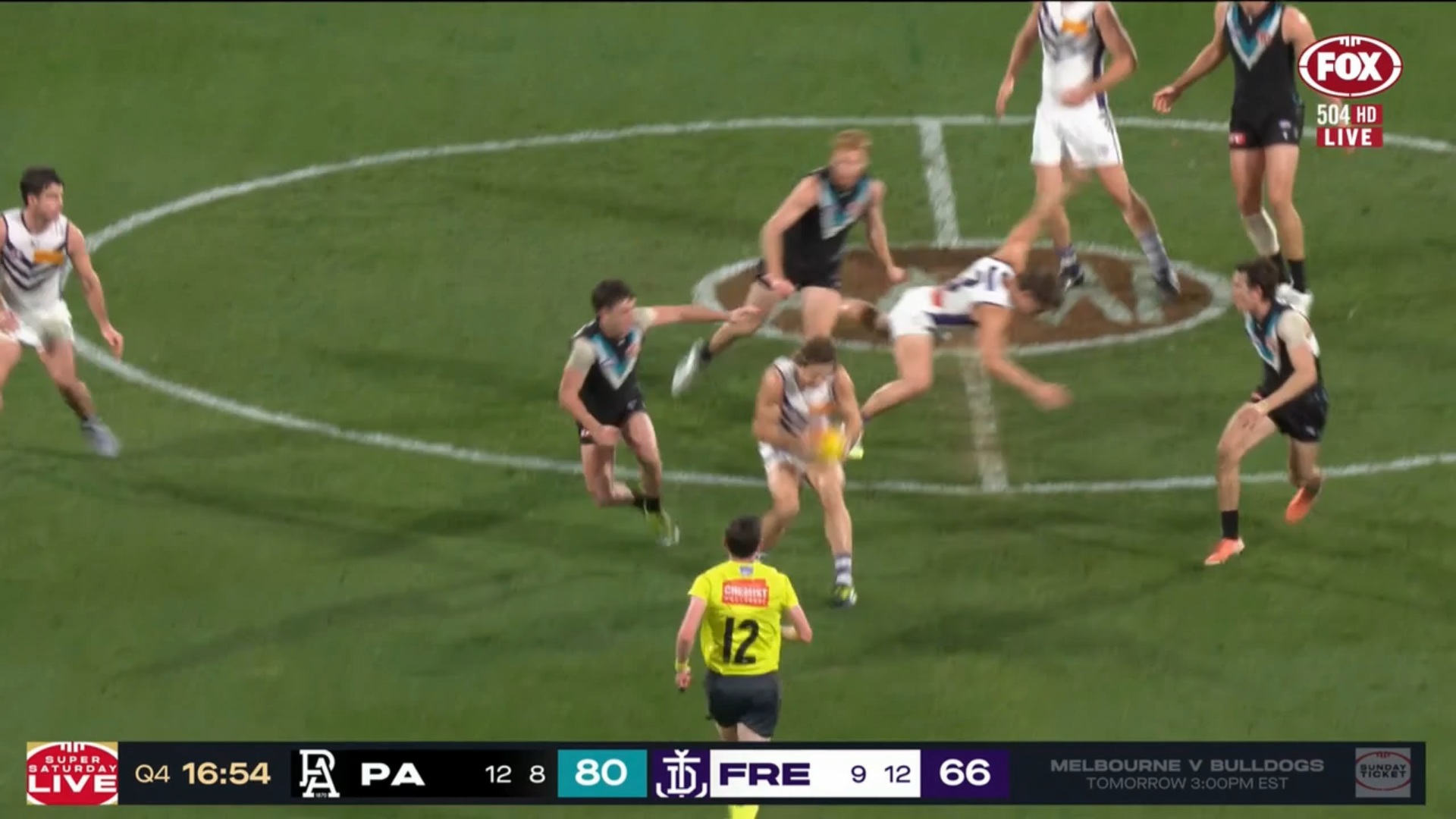
The kick is far from flash – accuracy has never been Fyfe’s strong suit – but with a tall forward line ahead of the ball and Port’s best defender for the night, Aliir Aliir, dragged back to the goalsquare by Luke Jackson, a drop zone of 40 metres out is the ideal spot for it.
From the spill, by virtue of the 6-6-6 rule, the Dockers just need one snapped link in Port’s defensive chain to pounce. It arrives with Jackson Mead committing the cardinal sin of all backmen, and getting himself caught ball-watching.
Sam Switkowski, who has drawn his man up into the centre square before following Fyfe’s kick back inside 50, is in the perfect spot to receive a handpass from Jye Amiss, the first man to gather the loose footy; from there, Mead’s position in no-man’s land, neither at the contest nor protecting his opponent, gives the Docker an easy handball over the top for Michael Frederick to receive and snap through a simple major.
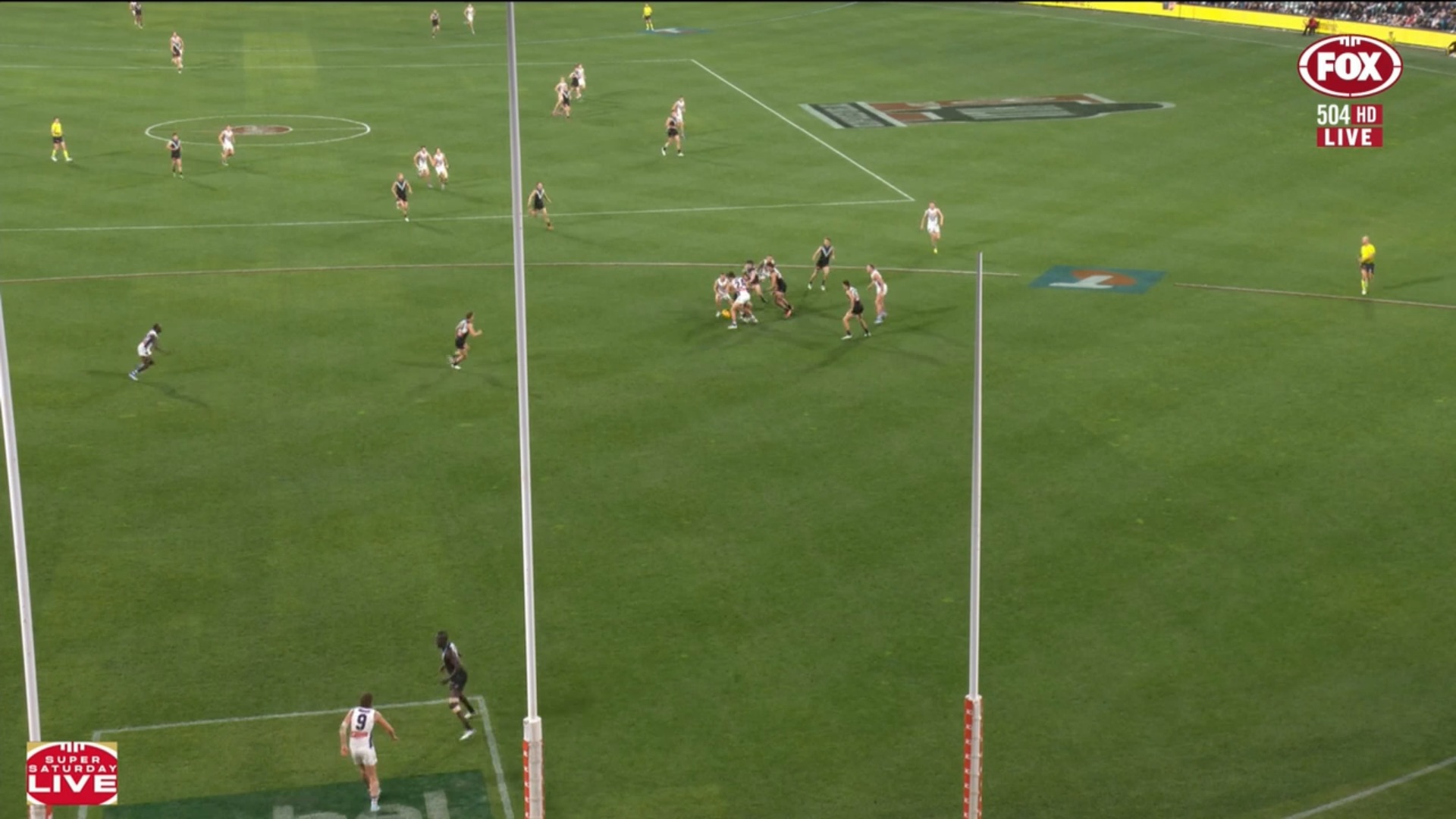
In the blink of an eye, the Dockers are back where they were at the start of the final term.
A few minutes later, it would be Fyfe and Frederick again, with a bit of help, to again edge Freo ever closer.
When an under pressure Luke Ryan blasts a rainmaker out of defensive 50, plenty hangs on what either side can muster when it finally lands. A Port intercept forces Freo’s defence to again need to reset, and the Power have proven incisive at finding targets in attack throughout the evening.
On the flipside, though, the Adelaide Oval is wide open behind it.
With just five disposals and no goals for the night, Jye Amiss has had himself a supremely dirty time of it: but Longmuir would have been thrilled at his attack on the marking contest: arriving too late to attempt to mark, he does the team thing and spoils, bringing the ball to ground out of the clutches of Mead.
As the ball bounces loose, Frederick makes the ultimate gamble: with it still in dispute, he begins sprinting towards goal – something he must have a licence for, because the sight of the Dockers No.32 in space at half-forward or the wing on a fast play is a common sight these days.
With superb nimbleness for a key forward, it’s Josh Treacy who roves the spillage: impressively, too, he keeps a clear head despite heavy congestion, refusing to be rushed or hack a kick forward, and instead perfectly drawing two Power opponents to send a handpass into Fyfe’s path.
It’s not accurate, but the veteran finally gathers a second before Butters arrives. He has little time for cleanliness, but it’s for that reason Frederick’s brave call from before is now a Dockers boon. It means all Fyfe needs to do is tumble the footy into his path, and the Dockers will be out and rolling.
From here, it’s a matter of not panicking. Frederick’s presence all alone at half-forward forces Aliir, the Power’s deepest defender, to leave Patrick Voss and stop his run. But all that does is offer the Docker a simple chip inside 50 – which he executes perfectly off the non-preferred left foot, mind you – to Voss, who has mimicked Frederick in making a beeline for the goals the second in became clear Freo were onto something.
Voss is no one’s idea of a safe kick for goal: he had 16 goals and 18 behinds to his name for the season before his breakout bag of six against Collingwood.
But he’s a rare footballer who seems to rise the tighter the situation, and so of course he nails the sort of straightforward yet always nervy goal Freo in their history have made a habit of not nailing.
From two inside 50s since being 14 points down, Fremantle have two goals. Power by two. Game on.
Defensively, too, the Dockers have lifted: a dangerous kick to the hot spot from Joe Richards off a Power centre square break, consistently threatening in the first three quarters, is safely marked by Jaeger O’Meara, who has pushed back hard off a wing for exactly this sort of backline cover.
The Power, too, are feeling the strain of victory tantalisingly within reach: having kicked beautifully all evening, two missed opportunities feel crucial, a tough Mitch Georgiades shot from the boundary drifting across the fact before ruckman Jordon Sweet makes a meal of a simple chance from virtually right in front.
Neither trouble the scorers – a fact that will prove supremely costly in the minutes to come.
Noticeable is that, despite plenty of time on their side, the Dockers are once again taking lessons from the Collingwood playbook, and looking to take the game on at every opportunity.
A Ryan intercept mark just on Port’s side of the centre square would at many points over the last two seasons have been the beginning of a slow play, probably involving a switch to the other side: in 2025, though, it’s the prelude to an instant play on, a trio of handballs working through the corridor, and a commitment to playing on and moving the footy forward even when it hits a dead end.
The result is a high-pressure inside 50 the Power barely get away with when Switkowski misses a left-foot snap for the lead: still, the sight of Port’s system breaking down spectacularly for every player to rush at Voss on the boundary line and leave him two loose handball targets at close range is an ominous sign for what lies ahead.
That commitment to playing on is again evident when Caleb Serong – what can’t he do? – leaps over Brandon Zerk-Thatcher for an intercept mark at half-forward, again driving the ball long and putting Port’s defence under the pump.
The benefit of that is to keep the ball away from Aliir, whose mark tally is 17 for the night, six of them intercepts, and allow for a boundary throw-in that eventually leads to a high, hacked kicked towards goal by Neil Erasmus that Voss very nearly wants enough to pinch from Aliir – and indeed, that he could easily have been paid.
Such is Freo’s surge that it feels like one mistake might be the backbreaker for the Power – and when Ollie Wines just barely misses Butters with a quicksilver handball at half back to turn the footy over, it comes.
Of course, the play starts again with Fyfe: gathering 60 from goal, he too chooses the high-risk, high-reward option: he handpasses not to Alex Pearce, alone but 20 metres further back, but instead to the nearby Jordan Clark, being hunted as he receives by Rozee.
He too has grander plans on his mind than the still open Pearce: as Rozee tackles, Clark goes for broke, handballing over his head inside 50, where surely he must know Port have the extra numbers.
If those two handballs were critical, three and four are of the kind that win matches. Andrew Brayshaw is the Docker on hand amid a sea of teal and black to get to the disputed ball first, and as Darcy Byrne-Jones wraps him up in the kind of tackle that brings lesser men to ground, he fights with all his might. He can’t shake him, but he can get both arms free and handball into the path of Murphy Reid, who finds himself hemmed in with Port jumpers on all sides and Brayshaw out of the play.
In a split second, Reid, who has already kicked the goal of the night to further his Rising Star credentials, shows why even if he doesn’t claim that award, his future is shining brighter than just about any other young talent in his crop.
As he gathers, he is met with a Power pincer: Mani Liddy closing in on his left side, another youngster in Jack Whitlock on his right. The option most players of any age would take in this situation is to bang long to the one-on-one in the goalsquare, and hope Treacy’s hands are sticky.
But you know what this wunderkind does?
He gathers, and in one fluid movement makes the impossible look easy: he executes a lightning-fast, blink-and-you’ll-miss-it, left-handed, overhead handball over the unsuspecting Whitlock’s head, having waited just a split-second to do it in order to draw him close enough to make it possible … and to leave Voss completely free in a pocket of space that a moment ago didn’t exist.
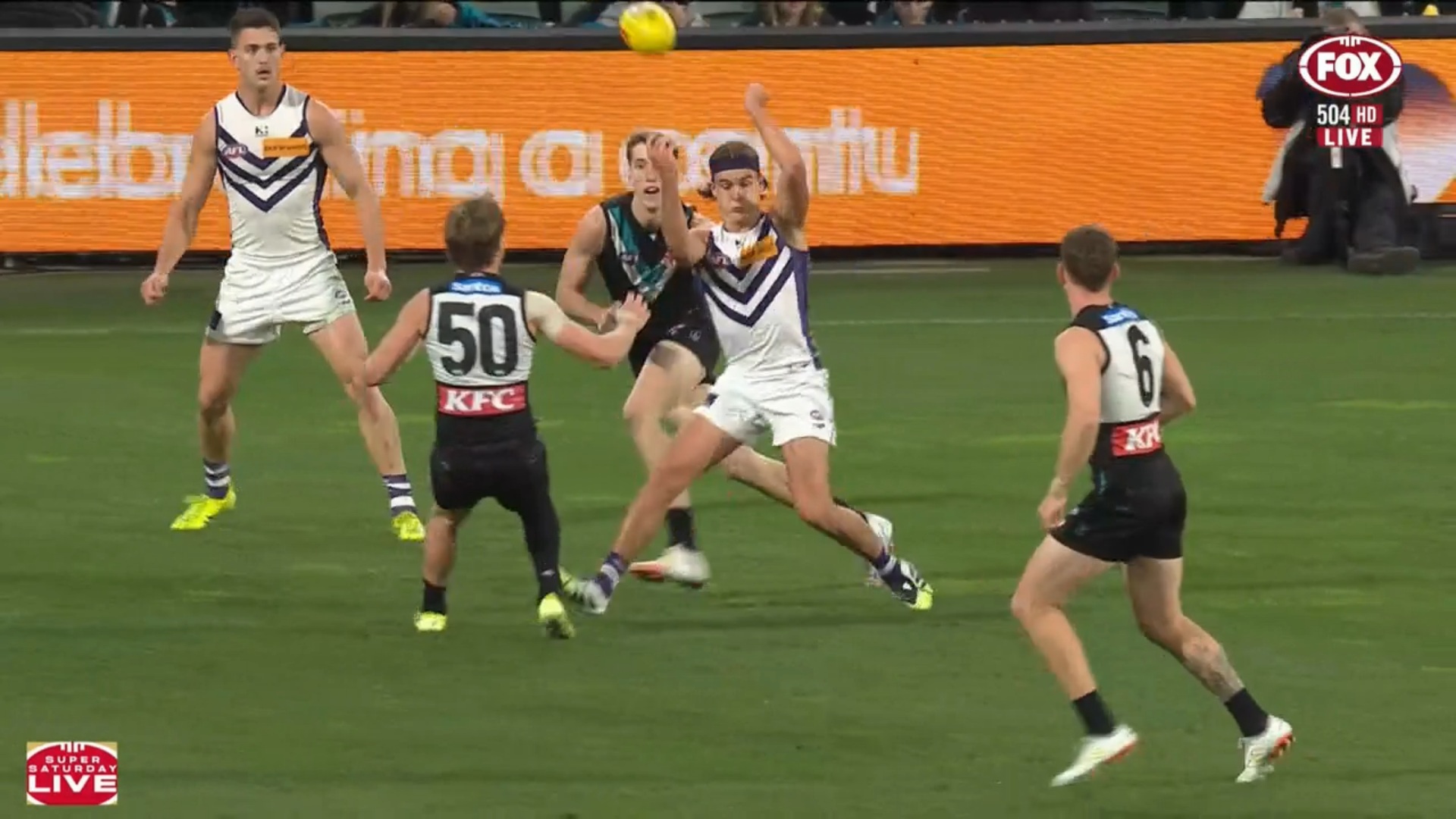
With half a second himself to line up the goals before Ryan Burton arrives to tackle, of course Voss’ kick never looks like missing.
Freo, suddenly, have the lead. The new problem is that it has taken them just half the quarter to erase the deficit – now they must do something far less in their comfort zone: hang onto an advantage late.
For all their close-game success of late, perhaps only against Carlton last week have the Dockers surged away once hitting the front – in all others, be they against Hawthorn and Collingwood or even lowly North Melbourne, they’ve had more than their fair share of panic moments before prevailing.
The first sign of that particular brand of terror for Freo fans comes when Voss marks strongly ahead of Aliir outside 50 from the next centre bounce, sees Treacy leading perfectly up at him, goes to pass: and flubs the kick spectacularly to fall straight into Byrne-Jones’ hands, some five metres short of where he was aiming.
Mistakes run both ways, though: at half-back a few minutes later, having sprinted across the ground to offer an outlet option, Travis Boak begins to look ahead for options to kick to as the ball reaches his hands … only to have it spill out. Even the greats aren’t immune to the pressure cauldron bubbling in the city of churches – and it’s a mistake he compounds not long after, when his sloppy manning of the mark at half-back gives up a 50m penalty, precious territory in such a tight match.
But there are heroes, too – Mead, whose poor defending cost the Freo goal that sparked their comeback, does brilliantly to outmark Reid at half-back, turning a likely Dockers sealer into a Port intercept, and another chance. Georgiades, too, fights excellently at ground level on the wing to draw a two-on-one against Pearce and Brennan Cox, forcing the ball over the line for a throw-in.
When the Power win it their way via a Wines free kick, then a Georgiades pack mark, they refuse to rush: Butters, receiving from Georgiades, finds Boak in space at half-forward, 60 out from goal. But they’ve given Freo time to set up in defence … or so it would seem.
For Travis Boak, who announced his retirement during the week, who has at times this season seemed a veteran who played on a season too many, who has twice blundered critical moments in the last five minutes, pulls off what might be the kick of the year.
It’s a sizzling pass into the only available vacant space inside 50: the forward pocket. And it catches Freo, all of whom inside defensive 50 have assumed responsibility for either a man or a dangerous potential drop zone for a long kick inside 50, napping.
Connor Rozee, who had sent himself forward for just this eventuality, catches Luke Ryan off guard by sprinting into that space, so hastily that, as he marks, he immediately begins to cramp up to the extent that it’s unclear whether he’ll be able to take the kick – or if he should.
Under those circumstances, with two minutes on the clock and the Power down by five, Rozee’s snap from the boundary line to give Port Adelaide the lead is as clutch a captain’s goal as you’ll see.
The problem, though, is that by hitting the front, they have reactivated Fremantle at their best: when it comes to hunting down a deficit late, they find another gear in 2025.
Eliminating Port’s one-point lead takes just seconds: a set play, Sean Darcy thumping the ball into space for Caleb Serong to gather, run five metres, and blast the ball long to Jackson and Treacy.
When they can’t mark, it’s Bolton at ground level, somehow drawing a fight with three Power defenders to force it over the line for a rushed behind that, it must be said, the Power were far too content to concede.
Who knows how this game pans out if one of Zerk-Thatcher or Josh Sinn, instead of running with Aliir after the ball, stepped in to shepherd Bolton off it, and allow their teammate to pick up and clear the area.
From the kick-in, the Dockers lift again: for the second time in the last quarter, Serong flies over Wines to pull down an intercept mark, an unlikely new string to his bow.
As he goes back to take his kick, Pearce, the Dockers’ break glass in case of emergency last-minute forward, heads inside 50, Freo abandoning an extra layer of protection behind the ball in order to chase a win.
Already, the Dockers have Jackson, Treacy, Amiss and Voss as tall options in attack.
But it’s Pearce, the lifelong defender, the unassuming captain, who flies in from the side for a contested mark to draw instant comparisons to the grab taken 20 years ago by Longmuir himself to win a game.
There’s a minute left to play. A score puts Freo in front. He has eight career goals in 134 games. Of course Alex Pearce was never going to miss.
44 seconds remain – enough time to squander it, though, especially when it’s Port who win the centre clearance. Pearce is straight back into defence, as is Josh Treacy – Fremantle are now in full save-the-game mode.
As Jordon Sweet drives the ball inside 50, it’s again Serong who comes up clutch – as Rozee flies for the ball, looking for all the world like he’s about to answer Pearce’s captain’s moment with another of his own, the Dockers star, renowned for his work at ground level for the contested footy, gets up again, this time getting just enough of a spoil to jar it from his fellow star’s grasp. A game-saving moment.
As is the grab back with the flight from Darcy, with 17 seconds left, off a kick that surely didn’t travel the 15 metres, to officially ice it. The Power win the ball back from his kick inside 50, and hack one last chance inside, but a Karl Worner spoil as the siren sounds ensures there will be no final twist.
Such are the fine lines season 2025 is based on as it hurtles to its conclusion.
If Serong didn’t take that crucial intercept mark before Pearce’s goal, or get a fingertip to that spoil of Rozee, Fremantle would be in jeopardy. Had Fyfe not stepped up with a series of pivotal acts, had Reid not pulled off the handball of the season, had Pearce not made the ballsiest of moves to send himself forward with a game to save as well as to win, the Dockers’ finals chances would be in new peril.
Once upon a time, Port Adelaide would have broken this football club – whether it was with their shock lead early in the last quarter, or via that Rozee goal that deserved to be a match-winner.
But now into fourth place, for the time being at least, this Fremantle appear to be made of sterner stuff.
The kind of stuff, as it happens, that does what this team have thus far in 30 years failed to do: win premierships.

